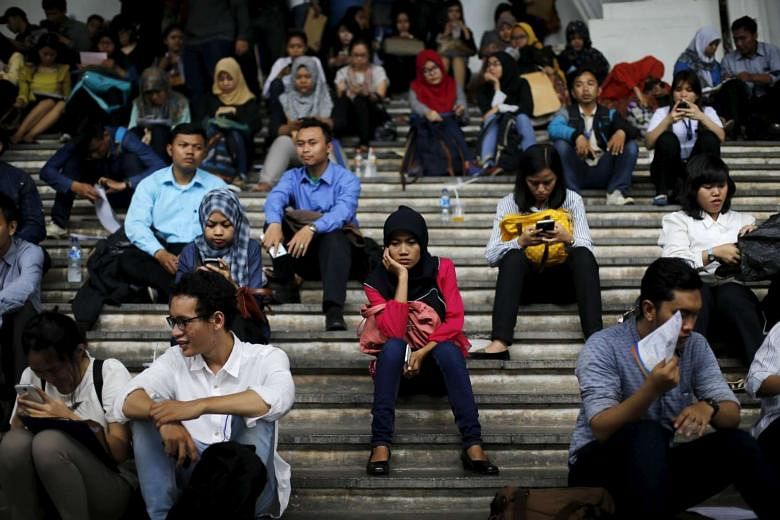SINGAPORE (Bloomberg) - For companies worried about a new Indonesian law requiring 10 locals to be hired for every foreigner, the government has a workaround: stock up on drivers and "office boys" to make tea.
"There is no need to be afraid," Mr Ruwiyono Septy Priharso, head of the work permit section at the manpower ministry, told an audience of mostly foreign business people at a seminar on the rules.
He suggested the quota could be filled by low-paid staff like office boys, a term that refers to mostly young men employed to do routine tasks. "They do not need to be permanent workers, but it is better if they are."
The rules, first unveiled in July, are undermining appeals by President Joko Widodo for foreign direct investment to help lift an economy growing at the slowest pace since 2009. The president, who has promised to cut red tape and is courting China to build infrastructure, may be facing a push back by trade unions worried about rising unemployment in the world's fourth-most populous nation.
The manpower regulations also require non-resident foreign company directors to obtain a work permit, a process that can take weeks and needs to be done within the country. International staff now need to get business visas in advance to attend internal meetings in Indonesia, do training or emergency jobs such as fixing machinery.
One stage in the visa process requires applicants to conduct a Skype interview with manpower officials. Priharso acknowledged that technical issues and a lack of staff were making this process difficult, causing a backlog.
"The latest regulations contradict the claims that Indonesia wants to create an FDI environment that is more attractive than its South-east Asia neighbors," said Mr Chris Wren, executive director of the British Chamber of Commerce in Indonesia.
"Some members are already planning to host regional meetings in Singapore rather than Indonesia. Some UK businesses that were considering Indonesia as a regional hub are having a re-think."
The rules follow a series of other protectionist measures and policy u-turns this year. Trade Minister Tom Lembong, a former private equity manager who has reversed some policies since his appointment in August, said the restrictions on foreigner permits and local worker quotas is "a big problem" being created by bureaucrats.
"For every one expat worker who comes in, that person creates between three and 12 jobs," Mr Lembong said in an interview last month. "You have to understand this is not coming from the president."
The government announced cuts in energy prices on Wednesday in the third installment of an economic reform package that the central bank said was helping restore confidence in rupiah and stock markets. The rupiah has strengthened 5.9 per cent this week, paring its loss this year to 10.4 per cent.
The backlash against foreign workers has come despite a shrinking number in the country. Out of a total workforce of more than 100 million, there were 54,000 registered foreigners as of August this year, down about 30 per cent from 2012, according to the manpower ministry. The largest group, numbering 13,000, are from China, it said.
Mr Joko is looking to increase Chinese investment to build railways, power stations and dams, and local media have expressed concerns about an "invasion" of foreign labour.
Citing the number of Chinese in the province of East Java, the region's government said it would force foreign workers to learn Indonesian as part of efforts to monitor them, according to a statement on its website. The manpower ministry had proposed, then quietly dropped, a similar requirement at the national level earlier this year after complaints by foreign companies and governments.
"The central government looks at the economy, but regional governments need to protect the jobs on their patch," said Mr Said Iqbal, president of the Indonesian Trade Union Confederation. "These rules are the only ones able to prevent the Chinese from coming in droves. They are a threat to Indonesian workers."
Around 43,000 workers in Indonesia lost their jobs between January and September after cuts by industries such as garments, footwear, electronics and coal, the Bisnis Indonesia newspaper reported, citing Ms Haiyani Rumondang, a director-general at the manpower ministry.
With unemployment rising as a result of the economic slowdown, the 10 Indonesians to one foreigner rule is "to ensure that companies that hire foreigners really need them," said Mr Umar Kasim, head of legal research and international conventions at the manpower ministry. "It is to have a positive effect on job creation."
Mr Joko has announced plans to scrap various rules for businesses, as part of measures to stimulate the economy. These won't include removing or amending the new manpower rules, though the government may be planning more regulations to clarify "gray areas", the manpower ministry's Mr Priharso said.
Indonesia has never had a policy of encouraging foreign professionals to work in the country and the latest rules reflect a push by labour unions against Chinese workers, said Mr Christopher Manning, an associate professor at the Australian National University who has researched labour issues in Indonesia.
Chinese labourers are coming into Indonesia along with investment from China, he said. "There is no precedent here for that. Even the Koreans doing construction don't bring blue collar workers in."

